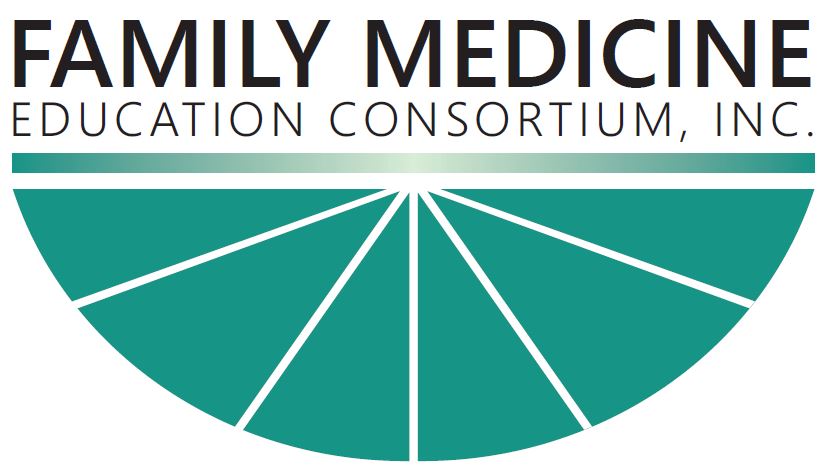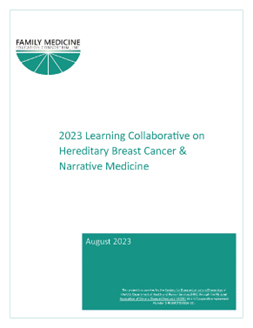Hereditary Breast and Ovarian CancerHelping Families Communicate About Hereditary Breast and Ovarian Cancer: IntroductionEarly detection, in conjunction with risk reduction, is essential to reducing cancer mortality rates. With an estimated ten percent of cancer diagnoses linked to a high-risk genetic mutation (≅ 200,000/year in the United States), identifying and counseling those individuals who carry the mutation can save lives. However, millions of Americans are unaware that they have a genetic mutation that increases their risk of developing cancer. Family physicians are at the heart of the early detection and prevention of cancer. This is particularly true with hereditary cancers. Family physicians and their care teams are uniquely positioned to assess their patients' risk and counsel them through options to evaluate and reduce their risk. This is why the Family Medicine Education Consortium (FMEC) created the 2023 Hereditary Breast Cancer/Narrative Medicine Learning Collaborative. According to the CDC’s Division of Cancer Prevention and Control, only about 41% of primary care physicians refer women with a high risk for breast cancer for genetic counseling and testing. Our challenge is changing this and asking how we can develop the means to stimulate authentic conversations that lead to action. Collaborative BackgroundThe FMEC is committed to engaging residency programs in learning collaboratives to advance quality healthcare and medical education. Not only can collaboratives improve care and teaching, but they meet the Accreditation Council for Graduate Medical Education (ACGME) cross-institutional collaboration requirements, which went into effect July 1, 2023. The guidelines state, “Programs are strongly encouraged to partner with other family medicine residency programs through regional learning collaboratives to share resources to facilitate programs and their family medicine practice’s attaining educational and community aims.” To help residencies meet this commitment, the FMEC launched the cross-institutional learning collaborative on Hereditary Cancers in Women and Narrative Medicine in early 2023. In partnership with the National Association of Chronic Disease Directors (NACDD) and utilizing funding and tools from the CDC’s Bring Your Brave campaign, participating family medicine residency programs convened virtually to learn about women’s hereditary cancer risk, using videos and stories in training and in clinic, and supporting women to learn about their risk, get testing, and find community supports. About Bring Your Brave CampaignBreast cancer is the most common cancer in women in the United States. While breast cancer mostly occurs among older women, in rare cases breast cancer does affect women under the age of 45. Nine percent of all cases of breast cancer in the U.S. are reported in this age group. Risk for breast cancer among young women varies based on factors such as family and personal history of cancer. Many young women do not know their risk for this disease or are not aware of ways to lower their risk. Understanding cancer risk factors and being proactive may help women lower their risk for getting breast or ovarian cancer at a young age, or lead to detection at an early stage when treatment works best. The Bring Your Brave Campaignprovides information about breast cancer to women younger than age 45 by sharing real stories about young women whose lives have been affected by breast cancer. For more information, visit the Bring Your Brave Campaign’s resources for healthcare provider education, and to view the manypatient stories, which can be shared with providers and patients via videos, podcasts, and handouts. Key Takeaways from the CollaborativeTakeaways at a Glance
Summary The Bring Your Brave Campaign is a versatile tool with several possible applications. The FMEC 2023 Learning Collaborative on Hereditary Breast Cancer & Narrative Medicine focused on the Campaign's impact on the training and skill development of family medicine doctors by incorporating campaign materials in residency training programs. While this project was not designed to evaluate patient outcomes, the ultimate goal of this work is, in essence, to lower cancer mortality rates and save lives. Research has shown that cancer early detection and risk reduction efforts are key, and increasing the identification of individuals who have genetic mutations that increase their risk of developing cancer in their lifetime can significantly impact these outcomes. Since it is estimated that only 41.1% of primary care physicians refer high-risk women to genetic counseling, increasing the likelihood of referral and testing is one step in achieving a lower cancer mortality rate. To increase the likelihood of family medicine practitioners routinely incorporating hereditary cancer discussions with their patients, we discovered there first must be a demystification of the genetic testing and counseling process. To begin this process, family medicine residency programs can incorporate the review and discussion of the Bring Your Brave resources with residents. This can be achieved in one-off seminars or fully incorporating a Family Medicine Genomics coursework option within training. In addition, residency programs would benefit from utilizing the Bring Your Brave Campaign as a case study of narrative medicine principles. This serves as an opportunity to educate residents on narrative medicine techniques for their own use, while simultaneously providing information and skill development around hereditary cancer risk assessment. While we have identified several topic areas where the Bring Your Brave resources can enhance residency curriculum, the most significant is hereditary cancer. Utilizing the Campaign to develop physician communication skills, increase empathy for patients’ experiences, challenge biases, and deepen subject matter knowledge. When these education components are offered and explored, Faculty and Residents showed a significant increase in comfort levels around hereditary cancer conversations with patients. In addition, exploring the Bring Your Brave campaign highlights and reinforces the critical role that family medicine physicians play in risk assessment and reduction for their patients. The combination of higher comfort levels and awareness of the role that family physicians play on the front line of hereditary cancer diagnostics has proven to increase the desire and the actuality of faculty and residents increasing the frequency of their risk assessment conversations in practice. Data and ResultsExplore the results for the following sections in our Collaborative Report.
Collaborative Report |










